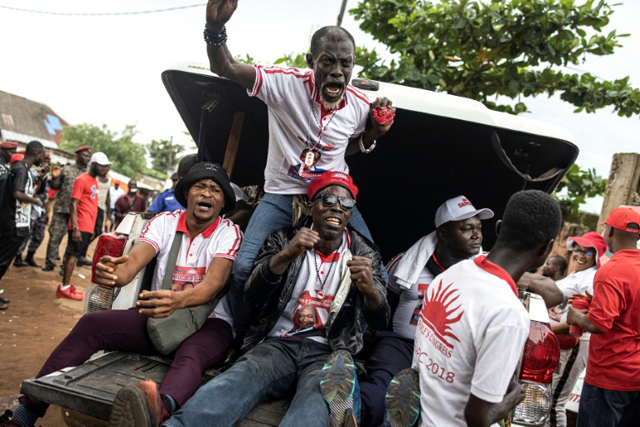
FREETOWN, June 20, 2023 (BSS/AFP) - Sierra Leoneans will vote in tense elections on Saturday, with President Julius Maada Bio hoping to secure a second term despite a crippling economic crisis which helped spark deadly protests last year.
The West African country, which never fully recovered economically from a 1991-2002 civil war and the Ebola epidemic a decade later, was further pummelled by the Covid pandemic and fallout from the war in Ukraine.
There are 13 candidates in the race for the top office, but Bio's main rival is Samura Kamara, a bookish technocrat with the opposition All People's Congress (APC), who came second in the last election in 2018.
This time around, however, the country of eight million is gripped by a dire cost-of-living crisis which contributed to riots last August that left more than 30 dead.
As of March, the latest month on record, yearly inflation stood at 41.5 percent.
"Citizens are finding it very difficult to even have three square meals a day... everyday prices of commodities are going higher," a 19-year-old resident of Cockle Bay slum in the capital Freetown told AFP.
Some 3.4 million people are registered to vote. Polling opens at 7:00 am and closes at 5:00 pm.
Presidential candidates must clinch 55 percent of the vote for a first-round win.
Voters will also elect members of parliament and local councils under a new proportional representation system after a last-minute switch from a first-past-the-post system.
Under a new gender act, one-third of the parliamentary candidates must be women.
About 60 percent of registered voters are between 18 and 35 years old, according to the Institute for Governance Reform (IGR).
- Bio the favourite -
At the helm of the ruling Sierra Leone People's Party (SLPP), Bio, 59 -- a former coup leader who spent three months as head of state in the 1990s -- championed education and women's rights during his first mandate.
In an interview with AFP, he said he would prioritise agriculture and reducing food imports next.
Kamara, 72 -- a former finance and foreign minister who lost to Bio in a 2018 runoff -- told AFP he would restore confidence in the country's economic institutions and bring in foreign direct investment.
He is currently on trial for embezzling public funds while he was foreign minister, in a case his supporters believe is politically motivated.
However, while he has campaigned on economic issues, observers believe the dire financial situation is unlikely to translate directly into a loss for Bio.
Most Sierra Leoneans vote on longstanding regional allegiances, and there is a perception that jobs and benefits will flow to regions whose politicians are in power.
A June 14 poll by the IGR, a partner of the pan-African pollster Afrobarometer, forecasts that Bio will win 56 percent of the vote with Kamara receiving 43 percent.
In the parliamentary election, it forecasts that SLPP will win between 56 and 61 percent of seats, with APC claiming the rest.
- 'Chaos everywhere'-
Bio's detractors say the civic space has shrunk on his watch.
Sierra Leone's score on the US-based democracy advocacy group Freedom House's annual index fell to 63 percent this year from 66 percent in 2018.
Traditional parade-like political street rallies have been banned this year to avoid potential violence.
Macksood Gibril Sesay, a former electoral commissioner, expressed concern that there "wasn't a process of healing" after the August riots.
"Everybody knows that elections are a period where they just need something to spark off and then there will be chaos everywhere."
The two main parties waited until just a month before elections to release their manifestos.
Since then, the opposition has lambasted the Electoral Commission of Sierra Leone (ECSL) for alleged bias in favour of the ruling party, raising speculation that it is laying the groundwork for a court challenge -- a tactic both parties have used in the past.
Mohamed Kenewui Konneh, the chief electoral commissioner, said the opposition was focusing more on attacking the body than going out to campaign.
"At the end of the day people will be confused" and not vote, he told AFP, urging the opposition to instead help educate voters on the new proportional representation system.
Disinformation abounds on both sides, and the online space could have a more significant influence on voters than ever this year.
Information Minister Mohamed Rahman Swaray told AFP that internet penetration had risen to nearly 3 million, from 370,000 people in 2018.